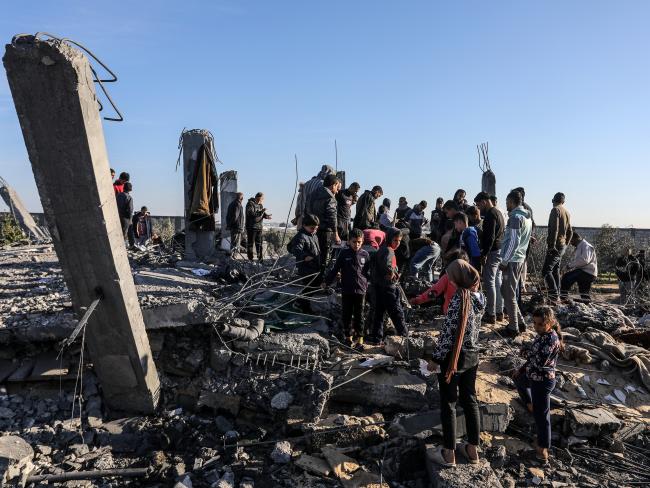22 April 2024

The result of arms spending. Rafah, Gaza after an Israeli air strike, 8 January 2024. Photo Anas-Mohammed / Shutterstock.
The USA has just worsened the prospects of peace in three regions of the world. On 20 April the US House of Representatives approved a $95 billion package of military and other spending.
After months of delay due to internal US politics, President Biden is expected to sign the package into law shortly.
War
The aid will expand and prolong the two current wars, leading inevitably to the unnecessary deaths of thousands more people in Ukraine and Palestine. It also increases tensions between the USA and China; this threatens to produce a war with China – something all too many US politicians and military chiefs are baying for.
‘The aid will prolong two wars and threatens another.’
The package breaks down into $61 billion to the Zelenskyy government in Ukraine, $26 billion to the Netanyahu government in Israel, and $8.2 more to the Asia Pacific, mainly for Taiwan. The greater part of the funds is for military equipment.
Ukraine
This support for Ukraine is in addition to $45 billion military aid provided since Biden took office. Ukrainian president Volodymyr Zelenskyy claimed that the extra aid would give his country “a chance at victory” and that it “…will keep the war from expanding, save thousands and thousands of lives, and help both of our nations to become stronger.”
The truth is precisely the opposite. Russia and Ukraine are locked into stalemate, unless Zelensky can drag foreign troops into the war. And more arms will bring greater conflict – more Russians and Ukrainians dead and wounded.
Israel
The package for Netanyahu includes over $9 billion humanitarian support – for Gaza and the West Bank. But that means Israel maintains control of the relief – and the US bars any of this going to UNRWA, the UN agency for Palestinian refugees.
Unsurprisingly the Palestinians are not impressed. Nabil Abu Rudeineh, spokesman for the Palestinian government, said the aid “…constitutes a dangerous escalation and aggression against the Palestinian people, giving Israel the green light to expand the scope of war to include the entire countries of the region.”
Hopes dashed
Palestine has long sought full membership of the UN. It became observer to UN General Assembly only in 2012, after long term opposition from the USA and Israel. Hopes expressed at the time that this would lead to a two-state solution in the region have been repeatedly dashed.
On 18 April the UN Security Council failed to recommend full UN membership for Palestine – once again due to a veto from the US. Switzerland and the UK abstained; the other 12 members voted in favour.
Restrictions placed by the US on the use of military equipment supplied to Israel don’t amount to a veto – as has become clear. Indeed the US policy is to give Israel enough weaponry to enable it to defeat any enemies.
Taiwan
The aid voted to Taiwan is all for military purposes and is a significant escalation. Increased diplomatic support for Taiwan from both President Biden and his predecessors Barak Obama and Donald Trump is backed by increasing amounts of military aid.
The Taiwan government welcomes this as contributing to its “defence”, of course. In reality the US actions are adding to tensions in the region.
Disputed
As with Palestine, Taiwan has been disputed territory for over 70 years – and foreign powers, principally the US, have been interfering for far longer. The defeated Nationalist government occupied the island in 1949 after the Chinese civil war and revolution; it continues to claim sovereignty over the whole of China.
‘USA has never given hope of greater influence over China.’
The US backed the Nationalists in the civil war and it has maintained support for Taiwan ever since, even after recognising the People’s Republic formally in the 1970s. But the US has never given up on its hopes of a greater influence in the region and directly over China.
Competitor
After decades of ambiguity and relative stability, tensions between the US and China have risen – not least because China is seen as an economic competitor. Biden talks of peace on one hand but his actions speak louder – invoking sanctions and supporting Taiwan (which seeks UN recognition, with US support).
And the British government has not relegated military interest on the region to history either. As well as hanging on the strategic and diplomatic coat tails of the USA, the 2021 Defence Review set out a “tilt to the Indo-Pacific”, especially China. And naturally this was justified as defending Britain’s interests – alongside its other “Global Britain” polices.
